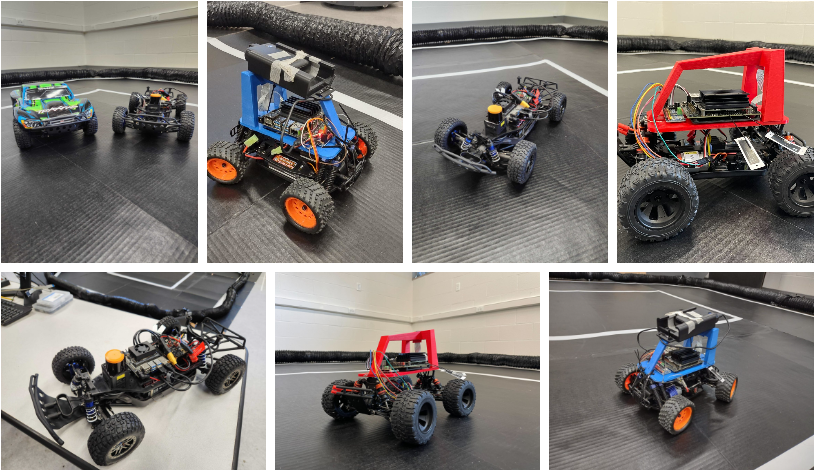This is a Course-based Undergraduate Research Experience (CURE) course aimed to provide hands-on research experience in a lab setting.
This course revolves around building a small-scale autonomous racing car that can navigate a circular track reliably and safely despite unexpected environment changes (e.g., different illumination or previously unseen obstacles) and mechanical degradations (e.g., slippery surface or depleted battery). Specifically, these 1/16th to 1/10th-scale racing cars are based on commercial RC hardware and equipped with a camera or a lidar sensor. Our deep learning-based software runs on a Linux system, which is deployed on an NVidia Jetson platform, and sends commands to an electronic speed controller that actuates the car’s motor and servos.
To be successful, this end-to-end robotic development requires diverse expertise from mechanical, electrical, and computing domains. Undergraduate students should expect to be assigned tasks that match their initial skills and also develop new competencies along the way. In the long term, autonomous racing cars will serve as a physical platform for evaluating and demonstrating the latest research of the TEA (Trustworthy Engineered Autonomy) Lab in predicting and validating the safety of autonomous systems. The skills and knowledge developed in our lab can be applied to a broad range of other autonomous systems and robots.
Under the supervision of Dr. Ivan Ruchkin and experienced student mentors, undergraduate students in this course will (i) assemble and configure the mechanical and electrical hardware of racing cars, (ii) program and train perception and control components for racing cars, (iii) assist comprehensive literature search and review, (iv) participate in weekly engineering meetings and research discussions. Depending on the circumstances, undergraduate students will also have an opportunity to contribute to research publications as co-authors.
Credits: 0 – 3.
Instructors
- Ivan Ruchkin, faculty
- Ao Wang, graduate mentor
- Sam Jhong, graduate mentor
- Nathan Norohna, graduate mentor
- Lorant Domokos, undergraduate mentor
- Yuang Geng, graduate meta-mentor
- Zhenjiang Mao, graduate meta-mentor
